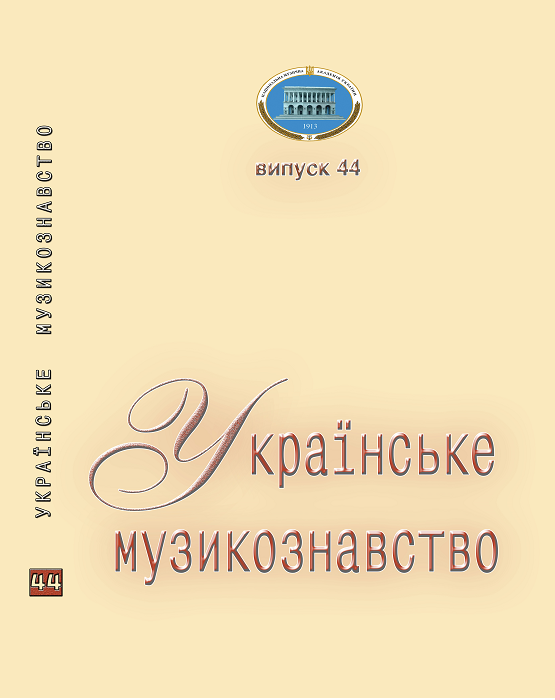Peculiarities of quotation perception in the world music (evidence from Deep Forest and DakhaBrakha creativity)
DOI:
https://doi.org/10.31318/0130-5298.2018.44.0.152882Keywords:
quote, ethnic music, folklore, Deep Forest French band creativity, Marta’s Song, DakhaBrakha Ukrainian band creativity, “Khmeleva project” albumAbstract
The problem of developing the musicology toolkit today is a methodological task on the way of studying the world music itself. The need in its development determines the relevance of this study. The main objective of the study is to find out the features of perceiving the quotation on the example of the world music.
Methodology. The analysis of creativity of the world music bands with different time and geographical setting (Deep Forest from France and DakhaBrakha from Ukraine) showed that the bands use similar methods of creating the compositions, which imply the use of the “someone else’s” musical text. To analyze their creativity, the concept of academic musicology called the “quotation principle” is adapted. The issues of quotation perception are considered, which are relevant for the analysis of the music not recorded in the printed music. The features of the perception of the quotation margins are analyzed in the works by Deep Forest and DakhaBrakha on the basis of the audience reviews about their music. The factors influencing the perception of the quotation margins in the music of the said bands are defined.
Results and conclusions of the study. The peculiarities of quotation perception in the world music are that the emphasis is completely shifted to its auditory perception. This fact activates those parameters of the quotation, which allow recognizing it “by ear”. They include not only the identification of its original source, which depends on the peculiarities of its operation in a particular society (for example, identification of Ukrainian folk songs in DakhaBrakha creativity by a Ukrainian listener). Another parameter is the presence of a bright quote margin, because the listener will determine the very presence of the quote depending on how it perceives the stylistic difference between the quote and its context (for example, the identification of traditional folk songs of Transylvania in the reviews on Deep Forest creativity). The significance of the study findings is expressed in an attempt to overcome the methodological problems in the analysis of music, which does not provide for being recorded in the printed music.
References
Aranovskiy, M. (1977), “Fifteenth Symphony of Shostakovich and some questions of musical semantics” [Pyatnadtsataya simfoniya D. Shostakovicha i nekotoryie voprosyi semantiki], Voprosyi teorii i estetiki muzyiki [Questions of theory and aesthetics of music], vol. 15, pp. 55–94. [in Russian].
Asafev, B. (1971), Musical Form as a Process [Muzyikalnaya Forma kak Protsess], 2nd ed., Muzyika, Moscow, 376 р. [in Russian].
Boiko, O. (2009), “World music: economic, political and socio-cultural background of the development of ethnic tendencies in contemporary popular music” [World music: ekonomichni, politychni ta sotsiokulturni peredumovy rozvytku etnichnykh tendentsii u suchasnii populiarnii muzytsi], Studii Mystetstvoznavchi [Art Studies Studios], vol. 4(28), pp. 106–111. [in Ukrainian].
“DakhaBrakha, Port Mone. Khmeleva project. (exclusive edition). /eco-pack/” [DakhaBrakha, Port Mone. Khmeleva project. (eksljuzyvne vydannja). /eco-pack/], available at: http://umka.com/ukr/catalogue/just-almost-jazz/port-mone-dakhabrakha-khmeleva-project-exclusive-edition-eco-pack.html#reviews (accessed 30 September 2018). [in Ukrainian].
Denisov, A. (2013), “About the non-musical semantics of the quotation” [O vnemuzyikalnoy semantike tsitatyi], Muzyikalnaya Semiotika: Perspektivyi i Puti Razvitiya [Musical Semiotics: Prospects and Ways of Development], GAOU AO DPO «AIPKP», Astrakhan, pp. 45–54. [in Russian].
“Correspondent: They threw hats. Interview with a member of the Dakha Brakha band” [Korrespondent: Zakydaly shapkamy. Intervju z uchasnykom ghurtu DakhaBrakha], available at: https://ua.korrespondent.net/journal/1595073-korrespondent-zakidali-shapkami-intervyu-z-uchasnikom-gurtu-dahabraha (accessed 30 September 2018). [in Ukrainian].
Kryilova, L. (1975), “Functions of quotations in a musical text” [Funktsii tsitatyi v muzyikalnom tekste], Sovetskaya Muzyika [Soviet Music], vol. 8. pp. 92–97. [in Russian].
Lytovka, Ya. (2013), “"World-music" as a means of national identification in the conditions of globalization” [“World-music” yak zasib natsionalnoi identyfikatsii v umovakh hlobalizatsii], Visnyk Kyivskoho Natsionalnoho Universytetu Kultury i Mystetstv. Seriia «Mystetstvoznavstvo» [Bulletin of Kyiv National University of Culture and Arts. Series in Arts], Vydavnychyi tsentr KNUKIM, Kiev, vol. 28, pp. 101–107. [in Ukrainian].
Lytovka, Ya. (2013), “"World-music" as a phenomenon generated by the processes of globalization” [“World-music” yak yavysche, porodzhene protsesamy hlobalizatsii], Visnyk Kyivskoho Natsionalnoho Universytetu Kultury i Mystetstv. Seriia «Mystetstvoznavstvo» [Bulletin of Kyiv National University of Culture and Arts. Series in Arts], Vydavnychyi tsentr KNUKIM, Kiev, vol. 29, pp. 91–100. [in Ukrainian].
Lotman, Yu. (1970), The Structure of the Artistic Text [Struktura Hudozhestvennogo teksta], Iskusstvo, Moscow, 384 p. [in Russian].
Mihaylov, M. (1981), Style in Music [Stil v Muzyike], Muzyika, Leningrad, 264 p. [in Russian].
Nazaykinskiy, E. (1972), About the Psychology of Musical Perception [O Psihologii Muzyikalnogo Vospriyatiya], Muzyika, Moscow, 372 p. [in Russian].
Nazaykinskiy, E. (2003), Style and Genre in Music [Stil i Zhanr v Muzyike], VLADOS, Moscow, 248 p. [in Russian].
“New-York almanac” [Nyu-yorkskiy almanah], available at: https://www.svoboda.org/a/25447988.html (accessed 30 September 2018). [in Russian].
“RadioDay. DakhaBrakh band” [RadioDen. Hurt “DakhaBrakha”], available at: https://www.youtube.com/watch?v=-BiDXQOwHwTw (accessed 30 September 2018). [in Ukrainian].
Tormakhova, V. (2014), “Folk music traditions in world music (on the example of the DAT band” [Folklorni muzychni tradytsii u world music (na prykladi hrupy «DAT»)], Visnyk Natsionalnoi Akademii Kerivnykh Kadriv Kultury i Mystetstv [Bulletin of National Academy of Culture and Arts], Milenium, Kiev, vol. 4. pp. 102–107. [in Ukrainian].
Tormakhova, V. (2016), “Characteristic features of the style of world music through the prism of the creativity of the DakhaBrakha band” [Kharakterni osoblyvosti styliu world music kriz pryzmu tvorchosti hurtu “DakhaBrakha”], Visnyk Natsionalnoi Akademii Kerivnykh Kadriv Kultury i Mystetstv [Bulletin of National Academy of Culture and Arts], Milenium, Kiev, vol. 1. pp. 89–92. [in Ukrainian].
Shnitke, A. (1990), The Polystylistic Tendencies of Contemporary Music [Polistilisticheskie Tendentsii Sovremennoy Muzyiki], Holopova V. N., Chigareva E. I. Alfred Shnitke. Ocherk Zhizni i Tvorchestva [Holopova V. N., Chigareva E. I. Alfred Schnittke. Essay of Life and Creativity], Sov. Kompozitor, Moscow, pp. 327–331. [in Russian].
Deep Forest: Bohême. available at: http://www.audio-music.info/htm/d/Deep_Forest_Boheme.htm (Last accessed: 30.09.2018). [in English].
Sweeney, P. (1992), The Virgin Directory of World Music, An Owl Book, Henry Holt and Company, New York, 262 p. [in English].
Taylor, T. (1997), Global Pop: World Music, World Markets, Routledge, New York and London, 271 p. [in English].
Frith, S. (Ed.) (1989), World music. Politics and Social Change. Papers from the International Association for the Study of Popular Music, Manchester University Press, Manchester, 216 p. [in English].




